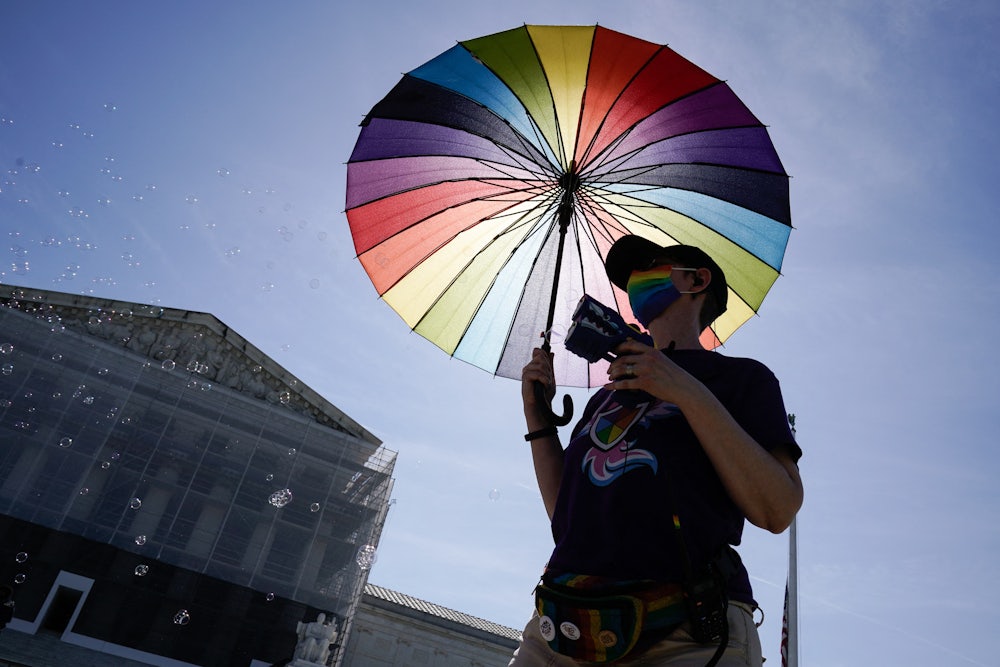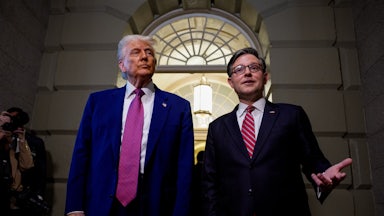The Supreme Court announced on Thursday that next term it will hear two cases on state bans on transgender athletes in women’s sports, setting the stage for a potential landmark decision on the future of transgender rights in general.
The two cases—Little v. Hecox and West Virginia v. B.P.J.—stem from legal challenges in Idaho and West Virginia, respectively. The states had asked the justices to review lower-court rulings that struck down the laws for violating the Fourteenth Amendment’s equal protection clause, the federal Title IX law, or both. The court took up the cases less than a month after it avoided answering the constitutional question in United States v. Skrmetti, where it ultimately upheld a state ban on gender-affirming care for minors on other grounds. By agreeing to hear the cases, the court appears to be headed toward a final decision on whether transgender Americans are protected as a group by the equal protection clause.
Lindsay Hecox, the transgender woman in the Idaho case, sued the state in 2020 after lawmakers enacted the Fairness in Women’s Sports Act earlier that year. The law explicitly requires all “interscholastic, intercollegiate, intramural, or club athletic teams or sports” in the state to designate their participation by “biological sex.” If an athlete’s sex is disputed, the state can verify it by checking their “reproductive anatomy, genetic makeup, or normal endogenously produced testosterone levels.”
In its petition for review, the state of Idaho countered that the law was necessary to counter “a growing trend of males identifying as females competing against—and beating—females in women’s sports across the country” over the previous decade. “Countless female student-athletes—including Olympic swimmers at the NCAA championships, high-school sprinters in Connecticut, and Ivy League swimmers—have been shoved aside by male athletes benefiting from obvious physiological advantages,” the state claimed.
Hecox’s own experience suggests otherwise. She successfully received a preliminary injunction from the lower courts that allowed her to try out for Boise State University’s track-and-field program, but ultimately did not make the team. The Ninth Circuit Court of Appeals upheld that injunction in 2022. Hecox continues to play for the school’s women’s club soccer team, which would be forbidden if the law is allowed to stand. She argued that the law violated the Fourteenth Amendment by discriminating against her on the basis of sex, and that the state had not provided sufficient evidence to support its claims.
West Virginia passed a similar law in 2021 that allowed “biological boys” to compete on publicly funded teams that were coed or designated for boys, but not on teams designated for girls. Though motivated by broader national debate about the issue, it appears to have only affected one student: B.P.J., a 14-year-old transgender girl who wanted to participate in her high school’s girls’ cross-country team. (The courts refer to her only by her initials because she is a minor.)
B.P.J.’s lawyers argued that her participation in high school sports poses no threats or harms to any other students. “B.P.J. socially transitioned in third grade; she has a West Virginia birth certificate officially recognizing her as female; and she has never gone through endogenous puberty—meaning that she has never experienced the effects of testosterone on her body that cisgender boys typically experience,” they told the justices in a reply brief.
After the state passed the law, B.P.J. and her parents sued the state to block it on both equal-protection grounds and Title IX, the federal law that prohibits sex discrimination in federally funded educational programs. (Hecox did not raise a Title IX claim in her case.) The Fourth Circuit Court of Appeals held that discrimination on the basis of transgender status, as occurred under the West Virginia law, was also sex discrimination and blocked the law accordingly.
By taking up the two cases, the justices are poised to issue a major ruling on transgender rights. The Supreme Court has heard cases on the scope of gay and lesbian rights for more than three decades, culminating in the 2015 ruling Obergefell v. Hodges that struck down same-sex marriage bans nationwide. But it has rarely addressed the “T” in LGBTQ rights directly. In the late 2010s, for example, the court turned down multiple opportunities to review state laws that banned transgender people from using the bathrooms that correspond to their gender identity.
In 2020, the justices issued their first ruling on transgender rights in Bostock v. Clayton County. The case involved gay and transgender workers who had been fired from their jobs because of their sexual orientation or their gender identity. In lawsuits against their employers, the workers had argued that they had violated Title VII of the Civil Rights Act of 1964, which bans workplace discrimination for a number of categories, including “on the basis of [...] sex.”
The 2018 retirement of Justice Anthony Kennedy, who wrote most of the court’s landmark rulings on LGBTQ rights, was widely expected to shift the court’s ideological balance away from further LGBTQ-friendly rulings. As a result, it was a major surprise when the court ruled in favor of the workers, holding that Title VII protected gay and transgender workers from discrimination. Justice Neil Gorsuch, who wrote for the court, and Chief Justice John Roberts joined the court’s liberals to form a majority.
“The statute’s message for our cases is equally simple and momentous: An individual’s homosexuality or transgender status is not relevant to employment decisions,” Gorsuch wrote in his majority opinion. “That’s because it is impossible to discriminate against a person for being homosexual or transgender without discriminating against that individual based on sex.”
Later that year, Justice Ruth Bader Ginsburg died and President Donald Trump appointed Amy Coney Barrett to fill the vacancy, shifting the court even further to the right. As a result, the court’s announcement last year that it would hear United States v. Skrmetti prompted some trepidation among LGBTQ-rights activists and their allies. In Skrmetti, a group of Tennessee families with transgender children had challenged the state’s recent ban on gender-affirming care for minors. (The Biden administration also sued the state, giving the eventual Supreme Court case its final title.)
In Skrmetti, the court considered whether transgender status or gender identity was a “suspect classification” under the Fourteenth Amendment’s equal protection clause. Under the court’s precedents, laws and policies that treat people differently based on certain personal traits—such as race or national origin—must meet an exceedingly high standard for legal review known as strict scrutiny to survive legal challenges. Laws that discriminate on the basis of sex are reviewed under intermediate scrutiny, a somewhat less exacting threshold as its name suggests.
Everything else is scrutinized under what is known as “rational-basis review,” meaning that the law survives judicial review for equal-protection purposes so long as the government provides a mere rational basis for the law. The plaintiffs in Skrmetti asked the Supreme Court to either recognize transgender status as a new suspect classification or, alternatively, to recognize that laws discriminating against transgender Americans must receive intermediate scrutiny instead as sex-based discrimination.
In its ruling last month, however, the court punted on the equal-protection question that both sides had argued. Instead, the court’s conservative justices upheld Tennessee’s ban on gender-affirming care for minors by concluding that it did not discriminate against transgender people at all. Chief Justice John Roberts, writing for the court, held that the laws instead survived rational-basis review as ordinary state regulations of medical procedures.
“This case carries with it the weight of fierce scientific and policy debates about the safety, efficacy, and propriety of medical treatments in an evolving field,” he wrote. “The voices in these debates raise sincere concerns; the implications for all are profound. The Equal Protection Clause does not resolve these disagreements.”
As I noted last month, Roberts’s decision is not exactly persuasive: The Tennessee law was drafted to deny medical treatments that transgender people use to transition and affirm their gender identities. The ruling seemed to be more of a product of the conservative wing’s own internal fissures over transgender rights than anything else. Only three of the court’s conservative members—Justices Clarence Thomas, Samuel Alito, and Amy Coney Barrett—indicated in concurring opinions that they would have rejected a new suspect classification for transgender Americans.
Barrett and Alito, in separate opinions, argued that “transgender status” did not meet the court’s traditional test for recognizing a suspect class. (Thomas joined Barrett’s opinion.) They argued that it was not an “immutable characteristic” since it was not identifiable at birth, that its members had not been historically excluded from the democratic process or faced de jure discrimination, and that it was not a “discrete group” since, in Barrett’s words, “the category of transgender individuals is ‘large, diverse, and amorphous.’”
It is not clear if that view commands a majority of votes on the Supreme Court, however. Roberts, Gorsuch, and Justice Brett Kavanaugh implicitly declined to join the other conservatives’ opinions in Skrmetti, either because they disagreed with them outright or because they found them unnecessary to resolve the case. The court’s three liberal justices, on the other hand, appear willing to extend the Fourteenth Amendment’s protections to transgender Americans as a group—and Roberts et al. didn’t join them, either.
This is not the only major case on LGBTQ rights before the court next term. The justices announced in March that they would hear a First Amendment challenge to Colorado’s ban on “conversion therapy,” the discredited practice that seeks to change a person’s sexual orientation through ostensibly medical or psychiatric means. With the addition of the sports-ban cases this week, next term is poised to be a watershed term for the future of LGBTQ rights—and how far the court is willing to go to push the nation in a more socially conservative direction.








